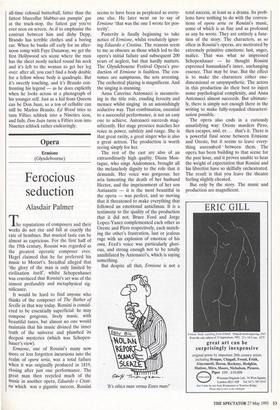Opera
Ermione (Glyndebourne)
Ferocious seduction
Alasdair Palmer
The reputations of composers and their works do not rise and fall at exactly the rate of hemlines. But musical taste can be almost as capricious. For the first half of the 19th century, Rossini was regarded as the greatest operatic composer ever. Hegel claimed that he far preferred his music to Mozart's. Stendhal alleged that `the glory of the man is only limited by civilisation itself', whilst Schopenhauer, was convinced that Rossini's art was of the utmost profundity and metaphysical sig- nificance.
It would be hard to find anyone who thinks of the composer of The Barber of Seville in that way today. Rossini is consid- ered to be essentially superficial: he may compose gorgeous, lively music, with beautiful tunes, but almost no one would maintain that his music divined the inner truth of the universe and plumbed its deepest mysteries (which was Schopen- hauer's view).
Ermione, one of Rossini's many now more or less forgotten incursions into the realm of opera seria, was a total failure when it was originally produced in 1819, closing after just one performance. The great man then recycled much of the music in another opera, Eduardo e Cristi- na which was a gigantic success. Rossini seems to have been as perplexed as every- one else. He later went on to say of Ermione 'that was the one I wrote for pos- terity'.
Posterity is finally beginning to take notice of Ermione, whilst resolutely ignor- ing Eduardo e Cristina. The reasons seem to me as obscure as those which led to the opera's initial failure and subsequent 200 years of neglect, but that hardly matters. The Glyndebourne Festival Opera's pro- duction of Ermione is faultless. The cos- tumes are sumptuous, the sets arresting. The orchestral playing is magnificent. And the singing is stunning.
Anna Caterina Antonacci is mesmeris- ing in the title role, exuding ferocity and menace whilst singing in an astonishingly seductive way. That combination, essential to a successful performance, is not an easy one to achieve. Antonacci succeeds mag- nificently. Her stage presence matches her voice in power, subtlety and range. She is that great rarity, a great singer who is also a great actress. The production is worth seeing simply for her.
The rest of the cast are also of an extraordinarily high quality. Diana Mon- tague, who sings Andromaca, brought all the melancholy dignity to the role that it demands. Her voice was gorgeous: her aria lamenting the death of her husband Hector, and the imprisonment of her son Astianatte — it is the most beautiful in the opera — was perfect, and so moving that it threatened to make everything that followed an emotional anticlimax. It is a testimony to the quality of the production that it did not. Bruce Ford and Jorge Lopez-Yanez complemented each other as Oreste and Pirro respectively, each match- ing the other's frustration, lust or jealous rage with an explosion of emotion of his own. Ford's voice was particularly glori- ous, and strong enough not to be totally annihilated by Antonacci's, which, is saying something.
But despite all that, Ermione is not a 'It's ethics mail versus Essex man!' total success, at least as a drama. Its prob- lems have nothing to do with the conven- tions of opera seria or Rossini's music, some of which is as fine and as profound as any he wrote. They are entirely a func- tion of the story. The characters, as so often in Rossini's operas, are motivated by extremely primitive emotions: lust, anger, malice. That was what so impressed Schopenhauer — he thought Rossini expressed humankind's inner, unchanging essence. That may be true. But the effect is to make the characters either one- dimensional or unsympathetic. The actors in this production do their best to inject some psychological complexity, and Anna Antonacci almost succeeds. But ultimate- ly, there is simply not enough there in the writing to make fully-rounded characteri- sation possible.
The opera also ends in a curiously unsatisfying way: Oreste murders Pirro, then escapes, and, er. . . that's it. There is a powerful final scene between Ermione and Oreste, but it seems to leave every- thing unresolved • between them. The opera has been building to that scene for the past hour, and it proves unable to bear the weight of expectation that Rossini and his librettist have so skilfully orchestrated. The result is that you leave the theatre feeling slightly cheated.
But only by the story. The music and production are magnificent.


































































 Previous page
Previous page